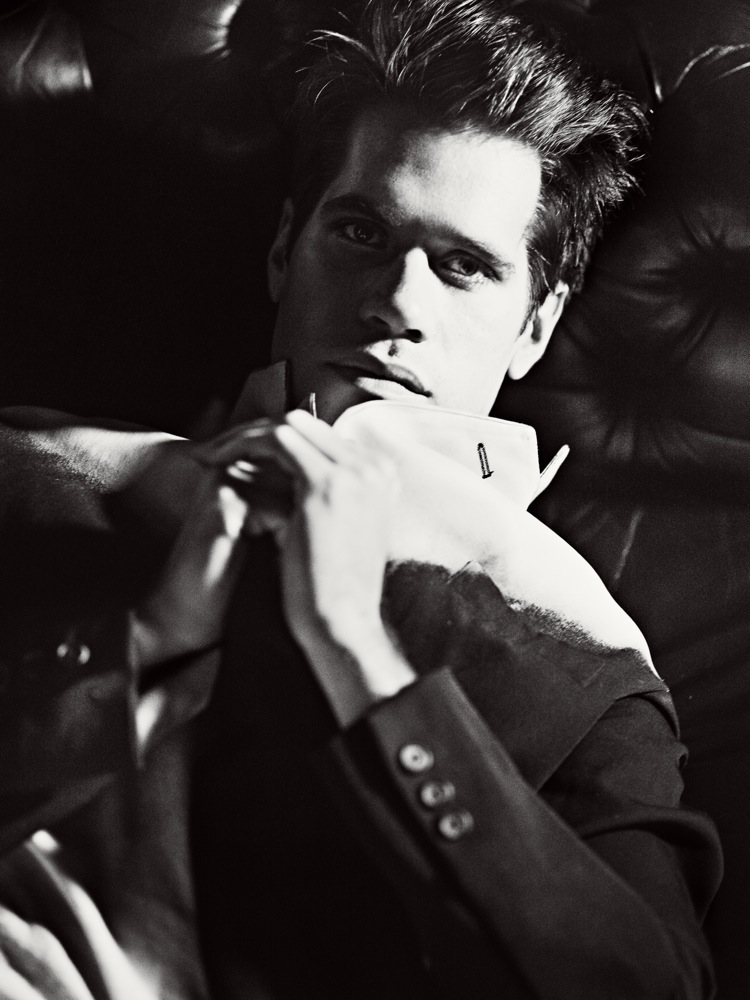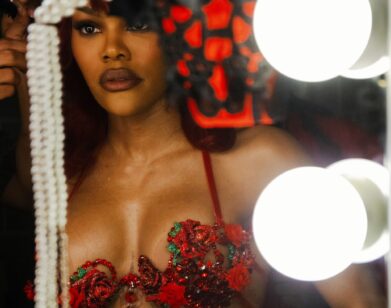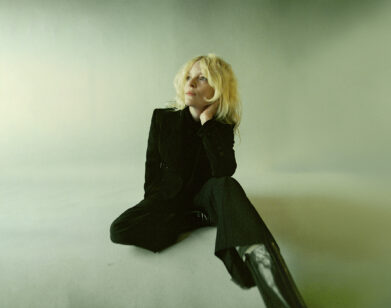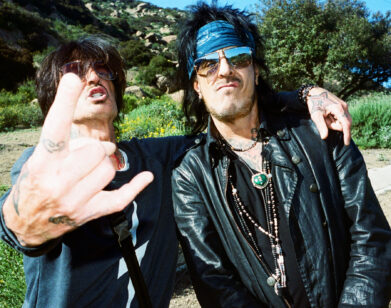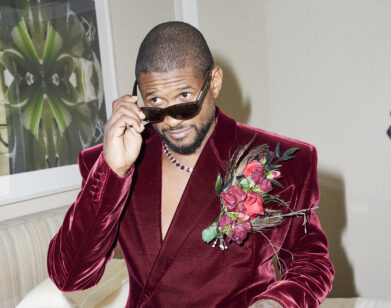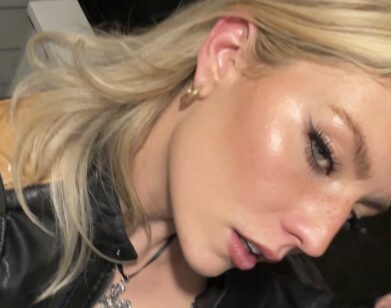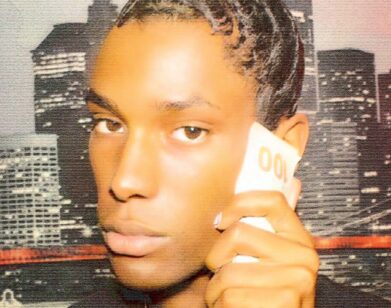Dive In
AARON MAINE (PORCHES) IN NEW YORK, DECEMBER 2015. PHOTOS: DAEMIAN SMITH + CHRISTINE SAUREZ. STYLING: DIANNA LUNT/ART DEPARTMENT. GROOMING: YUKIKO TAJIMA FOR ORIBE HAIR CARE/WM ARTIST MANAGEMENT. STYLING ASSISTANT: KATRINA ROZEVILLE. SPECIAL THANKS: LE BAIN AT THE STANDARD, HIGH LINE.
Aaron Maine has released four albums under the moniker Porches, but it wasn’t until recently that he wrote and recorded an entire album on his own. “I bought a computer, bought Logic, and got really obsessed with recording at home,” he explains. Out this Friday, Pool (Porches’ first release with Domino Records) focuses on heightened emotional experiences, with each song drawing inspiration from a specific moment. The musician wrote album closer “Security” at a low point in life, when he was dealing with a “shitty commute” from Manhattan to a construction job in Westchester, felt uncomfortable in his new apartment, and had no health insurance. “Man, I wish / There was a place / That I knew / I could always stay,” he sings with a digitally modified voice, atop slow and seductive electronic layers. Though Maine now has health insurance and feels at home in his apartment (shared with his girlfriend of four years, Greta Kline of Frankie Cosmos), the 27-year-old is still growing up. “I’m just dealing with the responsibilities of being an adult,” he continues, “one responsibility at a time.”
Prior to Pool and Frankie Cosmos’s latest EP Fit Me In, Maine and Kline played in each other’s bands. The two would write independently, but frequently record and tour together. “It was cool when we could do a Frankie and Porches tour, but when it was like that, it was double the work,” Maine recalls. “It was stressful not having enough time.” Now, more musically separated, “It’s been good to have more time to focus on Porches and writing.” Kline’s vocals are still featured in tracks such as “Hour,” “Be Apart,” and “Brave,” however, Porches’ new bass player takes over on other songs, including “Glow.”
When Maine creates something that “feels less Porches or more experimental,” he has also been known to release the music under the name Ronald Paris. “I think I’ll definitely put a Ronald Paris thing out between this Porches album and the next,” he says. “I’ve been really into making dance music—no vocals or narratives. I like the idea of making a dance tape, making 200 actual tapes and giving them to friends at a party to dance to.”
After meeting Maine in the lobby of his Greenwich Village apartment just before the winter holidays, we walk to Think Coffee, pausing outside to let him finish a hand-rolled cigarette.
EMILY MCDERMOTT: Before Pool, you didn’t have a computer and didn’t know how to use Logic, so bluntly speaking, how were you making music?
AARON MAINE: Just borrowing people’s computers or recording on tape machines. I didn’t really have any way to fully flesh out the songs, but I got really interested in that. By the end of the year [after releasing Slow Dance], I felt like I had enough songs for an album, so I chose 12 or 13 to record. I really like the demos and a lot of the process; recording the record was trying to recreate that demo feeling. I had never been too interested in recording myself…I always thought it should be left to someone who focuses on that.
MCDERMOTT: What shifted that interest?
MAINE: I think doing it at home and being like, “Oh this sounds pretty good. If I keep going, I can probably get the hang of it.” It’s great to do it at home. I don’t like having to wait for people, to get into a studio, or pay for it, or have a set block of time. My little studio setup is in our apartment. It’s sadly, like, half of the living room. Greta is very generous to let me take up all that space. [laughs] The sound feels lived in; you capture stuff you wouldn’t necessarily capture with someone else. I’m going to try to do the next one like this too, by myself. I bought some more equipment and decided I’m going to only record for keeps now. No demoing, other than a voice memo or something to get the idea down.
MCDERMOTT: Is there one song on Pool that you feel really encapsulates what you’re trying to do with it as a whole?
MAINE: Yeah, my favorite is “Underwater,” the first track. That was a breakthrough production-wise for me, and the overall mood really got what I was aiming for. There’s a Frankie Cosmos song called “Hi There Ronni Underwater,” so [now I have] that dialogue with, “Hi there Frankie underwater.” It’s about seeing a vision or leaving your body. I feel like that’s kind of a theme throughout the record, this out of body thing. But I don’t mean that in a drug way or spiritual experience. It’s more of reaching this content state and being there and not worrying about anything else, that feeling of just existing and not worrying about it—meditative, almost. Kind of like you’re at peace. A lot of the time I overthink stuff or am really anxious, but I get [to that place] when I’m recording. It’s not a literal thing. It’s just an overall feeling.
MCDERMOTT: You feel that way when recording, but does anything else help you reach that place?
MAINE: Being creative. It could be playing ping-pong, too—just those times when you feel happy with yourself in the moment and are not hung-up on anything.
MCDERMOTT: So tell me about your writing process. Do lyrics or music come first, or is it back and forth?
MAINE: It’s a little back and forth, but I write independently from music. I usually come here [to Think Coffee] and write for a while. If I feel like I have something good, then I’ll go up [to my apartment] and sing a line over and over until it fits. Once I have that, then I can build the rest of the song. The rest of the lyrics come pretty easily after the initial riff or the idea is established. Most of the time one emotional moment about anything, really, will inspire me to write one line. Then from that one line, I expand and create the world around that one particular emotion.
MCDERMOTT: You’re from Pleasantville, New York, which isn’t that far away if you take the Metro-North. Did you grow up coming into the city frequently?
MAINE: I didn’t come in that much—occasionally to buy skinny jeans on St. Marks Place or see some shows, but I had a really good group of friends. I was lucky enough to know a lot of musicians, kids that I skated with and made art with. I had a little situation in my mom’s basement where I could record and make noise during the day. When everyone was at work I would just rock out. I was playing trumpet from when I was in fourth grade to 12th grade.
MCDERMOTT: Do you still play?
MAINE: I haven’t in a while. I used to in some of my earlier stuff, but I started playing guitar in 9th grade, I think. I released my first thing when I was 17 and I was pretty obsessed with bands. I knew that people did [music for a career] and it was possible, but I didn’t know how to play the game, necessarily; I did it just because I wanted to. When I started Porches, once Slow Dance came out, we did a tiny little PR campaign and started getting write-ups. I started to understand that there’s stuff to be done behind the scenes to help you reach more people.
I was really happy with the response to the record. It made me want to work harder and think about the context of the world that my music lives in. Moving here [to Manhattan] helped a lot, getting out of the suburbs and my bubble. I feel like this huge growth has happened between when the last record came out and where I’m at now.
MCDERMOTT: What are some of the biggest changes? Aside from knowing how to produce and record…
MAINE: I really try and make music that I would want to listen to and I realized that I don’t listen to rock music, ever. I was hanging out with a friend and we were talking about music—I admire him and his tastes, and we just get together and make paintings, talk about music, show each other our new songs—and I started to have a better idea of where my music would be sitting in the world. I wanted to hone in, be really smart about the decisions I made, the sounds I used, the references I was making, the words I was saying. I looked at it a lot closer than I had in the past. It was always a little more guttural or emotional, and I still feel this is, but it’s a little more mature, less like, “Here it all is.”
I feel like people kind of chill out as they get a bit older and learn how to assess their emotions before acting immediately on them. Being in a relationship for four years, I’ve learned a lot about myself and confronting my emotions. There’s much less drama in my life, also, so that’s forced me to investigate my more subtle emotions. I find those interesting and almost cooler. It’s like, I’m tired of being this angsty kid yelling.
MCDERMOTT: Becoming more introspective…
MAINE: Yeah, angsty to moody.
MCDERMOTT: With both Ronald Paris and Porches, I want to ask why you create these monikers instead of ever using your real name?
MAINE: It goes along with the idea of being your ideal self, or feeling like your ideal self. By having Ronald Paris, I can make him whatever I want him to be or whatever I want to be, and separate that from myself. Also, it’s to kind of mark a new chapter in Porches. Because I’ve had that name for about five years now, it’s annoying to change it altogether because people have come to know that name and I don’t want to confuse anyone. It’s kind of like the newest era of Porches is Ronald Paris.
MCDERMOTT: With so many changes and developments in your process, how would you describe your approach toward music?
MAINE: I really like making songs and having them. It feels amazing to create something and just have it exist. It feels like you’re bringing something beautiful into the world and no one can take it from you and it doesn’t disappear. It’s comforting. If we’re talking about security, it’s really validating, to me, to collect the songs and have these things that I made. A big reason why I do it is that I feel really, really good if I record a song and I’m happy about it. It’s nice to work through my emotions that way—not learning about my emotions, but dealing with them, consolidating them, and getting it out. It’s cathartic. It’s crazy to think that it really resonates with people and helps them through tough times. Mainly, I just really like to create stuff. It makes me feel high.
MCDERMOTT: It seems like you make music purely for very personal reasons. Do you ever think about the audience when writing and recording?
MAINE: I do. It’s important because I am communicating with them, and they’re going to hear it a certain way. No matter how abstract the sentiment of the song is, I want to portray my view as clear as possible so people experience the song the way I experienced it. I know that doesn’t always happen, but I feel like there’s ways… It always comes back to, if I’m happy with it, then I feel happy putting it out, and if it’s not your thing, then it’s not your thing. I’m not trying to give the fans what they want, necessarily, in terms of the overall product, but I do think about the people who listen to it. I want us to be on the same page.
MCDERMOTT: You also make all of your cover art, right? What inspires you visually?
MAINE: Yeah, the last one I painted, and this one is a super cropped part of a photograph a friend took of me, but I designed it, framed it, and did the text and layout. But I don’t look at art that much. I’ve always loved Matisse in a huge way, and David Hockney. I like magazines, glossy photos and ads, and Instagram. But I don’t stare at an image and feel inspired deeply. I try to look at things that reflect the mood I want that day.
MCDERMOTT: Well, thank you so much for your time and meeting me. Is there anything else you want to talk about?
MAINE: This doesn’t have to be included, but I’ve been thinking about touring. I like touring, but what I love most is being at home and writing and recording. I’m not creative on tour. I don’t feel any inspiration to even write. You kind of have to be numb to get through it. It’s uncomfortable at times and something not many people can relate to. I’m really scared, because there’s a lot of touring [in 2016]—a month and a half when the record comes out in the U.S., then Europe, then probably another U.S. thing, and if it does well, I’ll go back to Europe. It’s terrifying.
I mean, it’s fun, I love performing for people and meeting new people, and there’s such a great band, but it’s grueling with the driving sometimes and sleeping on floors and shit like that. It’s great that you have an excuse to travel—like I don’t need to go on a vacation anywhere crazy because I get to see these places—but it’s time consuming. I don’t like it because I like to be as productive as possible, and I don’t think [touring] contributes to the songwriting process and the things that are most important to me.
POOL WILL BE RELEASED FRIDAY, FEBRUARY 5 VIA DOMINO RECORDS. FOR MORE ON THE ARTIST, VISIT AARON MAINE‘S BANDCAMP.

